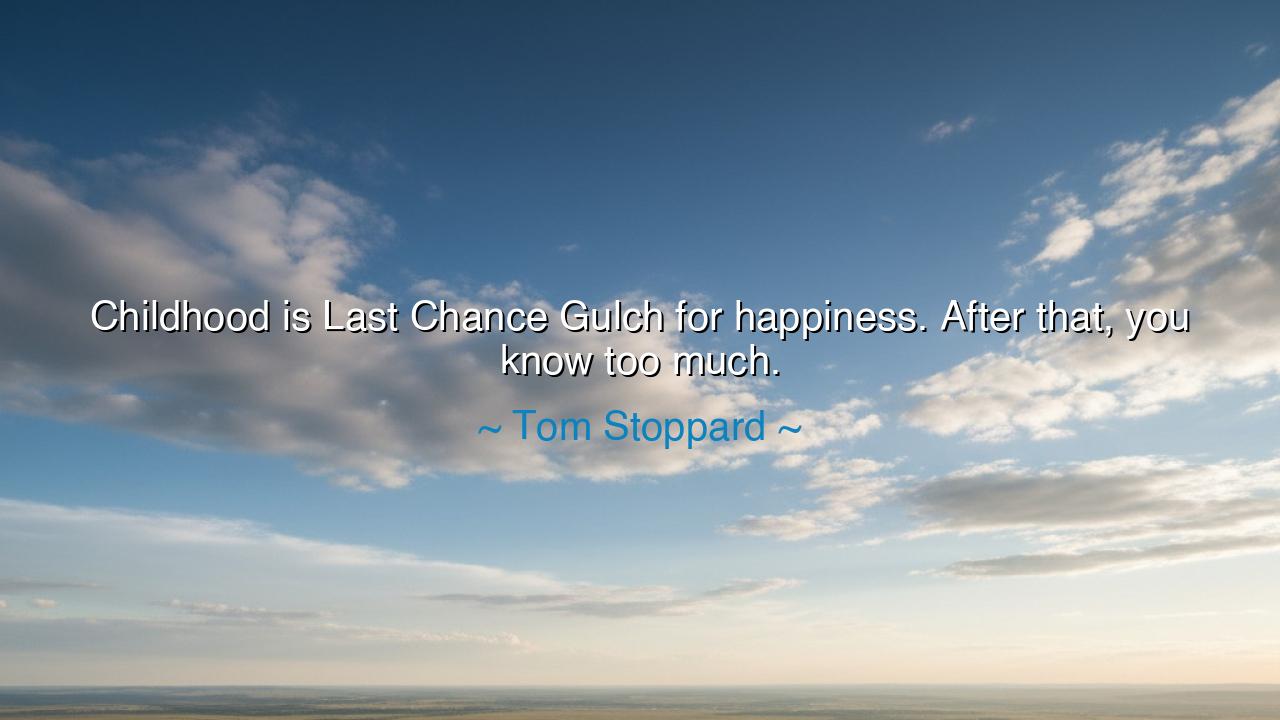
Childhood is Last Chance Gulch for happiness. After that, you






In the twilight of innocence, there exists a precious period where the world is full of wonder and joy—a time when we are unburdened by the complexities of life. Tom Stoppard, the acclaimed playwright, captures the essence of this fleeting moment when he says, “Childhood is Last Chance Gulch for happiness. After that, you know too much.” These words are imbued with the profound realization that childhood—with its unfiltered joy and limitless possibility—is a unique window of time, and once it passes, the weight of knowledge and experience clouds the simple happiness that once came so freely. In the early years of life, the world is seen through eyes of pure wonder; as we grow older, the complexity of existence dims that light.
The ancients understood this well. The Greeks, in particular, valued youth as the time for innocence, learning, and growth, but also recognized that with maturity came the burdens of wisdom and responsibility. In Plato’s Republic, he speaks of the philosophical journey—one that begins with the innocence of youth but gradually leads to the weightier task of understanding the world and the self. The transition from the untroubled existence of childhood to the deeper, more complex world of the adult is not without loss. As Plato himself suggested, knowledge often brings with it a form of sorrow, for with it comes the awareness of imperfection, mortality, and the limitations of the human condition.
Consider the myth of Pandora in Greek mythology. In her innocence, she opened the box that released all the evils of the world into human existence—sickness, grief, and death—but with them came the one gift of hope. Pandora’s story is a reflection of the transition from childhood to adulthood, from a world of innocence and wonder to one filled with knowledge and the understanding of suffering. Before the box was opened, the gods had created a world that was unmarred by knowledge. Once Pandora, like the child, was allowed to experience knowledge, the world she knew was changed forever. In much the same way, Stoppard’s quote speaks to the paradox of growing up: in our pursuit of knowledge and truth, we lose the freedom and joy that come with ignorance.
Shakespeare, too, in his plays, often touched on the tension between youth and maturity, showing how the innocence of youth is a fleeting treasure. In As You Like It, the character of Jacques famously declares, “All the world’s a stage, and all the men and women merely players,” recognizing that youth is but one act in the play of life. His portrayal of the Seven Ages of Man highlights the stages through which we pass, each one bringing a new role, but none as joyful or unburdened as that of childhood. In the innocence of childhood, one is free from the weight of worldly concerns—a state that, according to Stoppard, can never truly be reclaimed once lost.
In the modern world, too, we see the delicate balance between the happiness of childhood and the complexities that come with adulthood. The story of Anne Frank, the young Jewish girl who found solace in writing her diary while hiding from the Nazis, poignantly shows how a child’s world can be upended by the harshness of knowledge. In her diary, she writes of her hopes and dreams, of the future she had envisioned before the cruelty of war shattered her life. Her story is a tragic example of how childhood, with its boundless potential for joy, can be stolen away by the weight of the world’s harsh realities.
The lesson of Stoppard’s words is not to lament the loss of childhood but to recognize the importance of preserving wonder even as we grow older. Childhood, as Last Chance Gulch, may indeed be a rare moment in life, but it also serves as a reminder of the freedom and happiness that can come from an untainted view of the world. As adults, we must find ways to return to that innocence—to approach life with the same wonder and joy we had as children. This might mean embracing curiosity, letting go of the rigid boundaries we create around our understanding of the world, and allowing ourselves to experience life’s mysteries without the constant burden of knowing too much. We must learn to balance the wisdom of age with the playfulness and joy of youth, remembering that happiness is not found only in what we know, but in how we experience life.
In our own lives, let us seek to protect the essence of childhood, not just in the young but in ourselves. Let us embrace moments of joy without the weight of expectations and knowledge that adulthood often brings. While it may not be possible to reclaim the simplicity of childhood, we can learn to cultivate that sense of wonder in our daily lives, appreciating the beauty of the world around us and the gift of living in the moment. The ancients knew this well—happiness often lies not in knowing all, but in embracing the world with an open heart, much like a child does, and finding joy in the little things that often go unnoticed by the weary adult soul.






AAdministratorAdministrator
Welcome, honored guests. Please leave a comment, we will respond soon